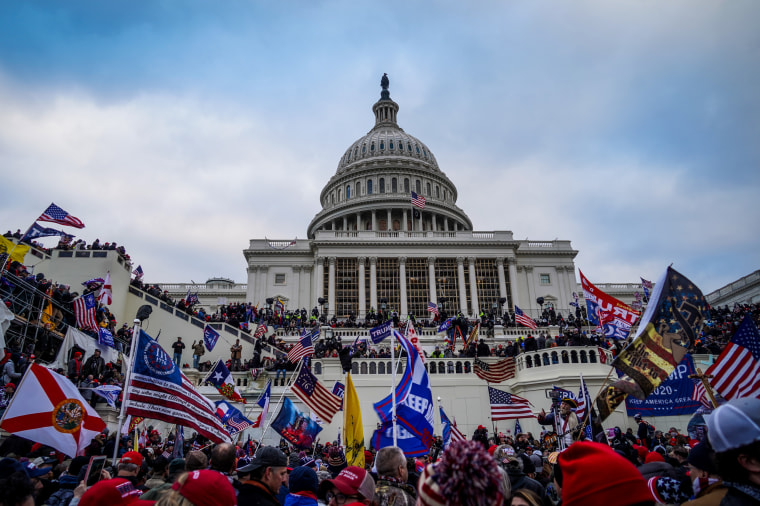It might seem implausible to think Donald Trump would come up with entirely new ways to offer support for Jan. 6 rioters, criminals, and defendants, but the former president keeps pushing the rhetorical envelope. The New York Times reported, for example, on comments the Republican made the day before the third anniversary of the attack on the Capitol.
In Sioux Center, Mr. Trump downplayed the events of the day, labeling the people serving prison sentences for their roles in the Capitol attack as “hostages,” a comment he has made before. Their time in prison, he said, would “go down as one of the saddest things in the history of our country,” adding that “nobody has been treated ever in history so badly as those people.”
In other words, Trump looks at a historical record filled with examples of genocidal violence, slavery, and other crimes against humanity, and he nevertheless comes to the conclusion that “nobody has been treated ever in history so badly” as those accused of attacking the U.S. Capitol at the then-president’s behest.
A day later, the likely GOP nominee, making another appearance in Iowa, added, “They ought to release the J6 hostages. I call them hostages. Some people call them prisoners, I call them hostages.” In apparent reference to President Joe Biden, Trump added, “Release the J6 hostages, Joe. Release them, Joe. You could do it real easy, Joe.”
A rhetorical escalation like this seemed unlikely in early 2021. Revisiting our earlier coverage, in the immediate aftermath of the assault on the Capitol, members of the White House Cabinet began conversations about removing Trump from office by way of the 25th Amendment. He and his team decided he needed “cover” to remain in the White House.
And so, the then-president said on Jan. 7, “Like all Americans, I am outraged by the violence, lawlessness and mayhem.” He went on to describe the riot as a “heinous attack.”
Reading from a prepared text, Trump added: “The demonstrators who infiltrated the Capitol have defiled the seat of American democracy. ... To those who engage in the acts of violence and destruction: You do not represent our country, and to those who broke the law: You will pay.”
Five days later, the Republican condemned the “mob [that] stormed the Capitol and trashed the halls of government.” On the final full day of his term, again reading from a script, Trump added: “All Americans were horrified by the assault on our Capitol. Political violence is an attack on everything we cherish as Americans. It can never be tolerated.”
In the months that followed, however, Trump struggled to keep up the pretense that he almost certainly never believed in the first place. By May 2021, the former president was suggesting the rioters were victims. He eventually started describing them as “patriots.”
In the months that followed, he found new ways to go even further. Trump released a song with Jan. 6 inmates, vowed to issue pardons, raised the specter of official government apologies, and headlined multiple fundraisers for Jan. 6 defendants, even as the Republican faces felony charges for his role in trying to overturn his election defeat.
A few months ago, the former president embraced “hostages” as a rhetorical staple, and as was clear over the weekend, he’s increasingly eager to undo any kind of accountability for the convicted and suspected criminals.
That’s notable in its own right — Trump is obviously forfeiting any credible “law and order” claim — but it’s also worth appreciating the fact that the Republican is even further to the right on this issue than much of his own party’s base. As a recent Washington Post analysis explained, in reference to the newspaper’s latest national poll:
While Trump has made pardoning Jan. 6 participants a key 2024 plank, only 42 percent of Republicans buy into the idea that their legal punishments have been too harsh. A majority of the GOP says the punishments have been either “fair” (37 percent) or “not harsh enough” (17 percent). Similarly, just 35 percent of Republicans say that those who entered the Capitol that day were “mostly peaceful” — despite the efforts of the likes of Tucker Carlson to make that case.
Republican voters have steadily grown more forgiving of the Jan. 6 riot, but Trump’s extremism on the assault has even outpaced his party’s.
This post updates our related earlier coverage.

